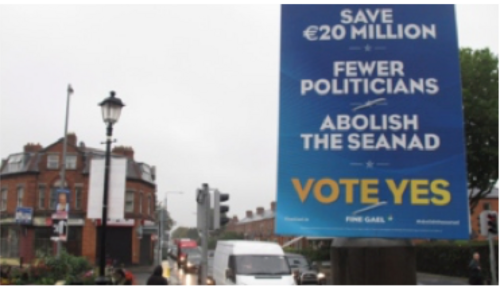-
Geopolitics
Hi guys! Today a new article relating to the geopolitics in Ireland!
Presentation of Irish’s government
Nowadays, Ireland is a parliamentary democracy. The Head of the Government is the Taoiseach (Gaelic word which means prime minister). The Tánaiste is the Deputy Prime Minister. The President of Ireland appoints the Taoiseach after being designated by Dáil Éireann, the lower House of Parliament. The Taoiseach and the Ministers collectively form the Government under the Irish constitution, and they hold executive power. The Parliament is called the Oireachtas. Like in France, there are two Houses of Parliament: House of Representatives (it represents the “Assemblée Nationale” in France) and the Senate.
Enda Kenny is the current Taoiseach
The House of Representatives is composed of 166 members, who are elected using proportional representation, and the elections take place every five years.
The current government was elected in 2011, so the next election will be next year (2016). It is a coalition between "Fine Gael" (progressive centre) and "Labour" (which is a social-democratic political party in the Republic of Ireland). The other main political parties represented in the House of Representatives are "Fianna Fáil" (The Republican Party) and Sinn Féin (an Irish republican political party active in both Ireland.)
The Senate is made of 60 members. They are nominated by the prime minister or elected from vocational panels.
The Senate can initiate or revise legislation, but the House of Representatives can reject its amendments and proposed legislation.
There are also 114 local authorities in Ireland which manage health, transport, housing... This authorities are mainly concerned by the questions of the locality, and don’t interfere with the general politics.
The people directly elect the President of Ireland. Unlike in France, the president hasn't a major role in politics. The current President, Michael D Higgins, was elected in 2011. He's elected for seven years.
Michael D Higgins
Regional geopolitical political and economical context
In this part I will discuss about some main political fact in Ireland.
- Abortion
The issue of abortion divided the parliament. Before 2012, abortion was forbidden in Ireland. However, after the death of a young woman in Galway in October 2012, a draft law allowing abortion in cases of proven risk to the life of the mother and in very limited circumstances.
Irish people were in favour of the draft law (81%). Yet, the Catholic Church has taken a position against, as well as seven members of the House of Representatives and the Minister for European Affairs Lucinda Creighton.
Nowadays, in Ireland, women may abort in cases of rape or critical situations. Approximately 4,000 abortions per year are recorded in Ireland.
- Senate abolition:
In 2014, the Irish voted 51.7% against the proposal to abolish the Senate. Prime Minister Enda Kenny was at the origin of this idea, which is part of a policy of institutional reform decided by the coalition.
His idea was simple: remove the Senate to reduce public spending of 20 million € and reduce the number of politicians. The reason was because the senate doesn’t have a core role in the Irish political life.
An advertisement for the "yes"
- Gay wedding
The Irish government voted and decided, in November 2014, to organize a referendum in 2015 about gay wedding. The government has said they will actively support the camp of "yes." Thus, we’ll have the issue of this issue soon.
In this second part I will talk about Irish economy and its relationship with European Union.
- Crisis
The crisis has brutally hit Ireland, after the bursting of the Real Estate Bubble.
Banks were facing a major cash crisis. State responded with an unlimited guarantee on bank deposits, causing a significant increase in the public deficit (32% of GDP in 2010). Budgetary constraints have forced the government to request, on 21 November 2010, IMF aid amounting to € 85 billion. Regarding the issue of the reduction of its bank debt, the country has signed an agreement with the ECB.
The corporation tax at 12.5% is an important element of the Irish strategy to attract foreign direct investment.
Nowadays, the economic is recovering, even if it's still weak. Growth has resumed in the second quarter of 2013 (+0.4%). Unemployment has decreased slightly, but remains at a high level (13.3% of the population). Household indebtedness is still a problem to solve. Socially, the young people were the looser of the crisis (28% unemployed person).
- European Union
Ireland is part of the European Union since 1973. In 2002, Ireland has chosen euro as the official currency.
External regional conflicts or tensions
Discreet but active, the Irish diplomacy focuses on three axes: the links with the United Kingdom and the United States, European commitment and the United Nations.
Historically neutral, Ireland makes a defence policy explicit. At national level, the Irish Army provides support to civilian forces. Naval Service and Air Corps Irish monitor the large maritime area, and contribute to the fight against drug trafficking.
Irish defence forces are deployed outside only through multinational peacekeeping or humanitarian operations.
The budget for defence is weak (less than 1% of the global budget) and there are 9500 soldiers. Ireland is very interested in the "pooling and sharing" of the EU initiative.
The Irish development assistance focuses on Africa. In September 2011, during the first Economic Forum Africa Ireland, the Minister of Foreign Affairs presented the "African strategy" of Ireland, to include trade and economic dimension in foreign policy.
In conclusion we can say than Ireland is neutral, there are no "big" geopolitical conflicts.
However, a lot of Irish are still shocked by the Civil War.
Thanks for reading me! See you soon!
-
Commentaires






